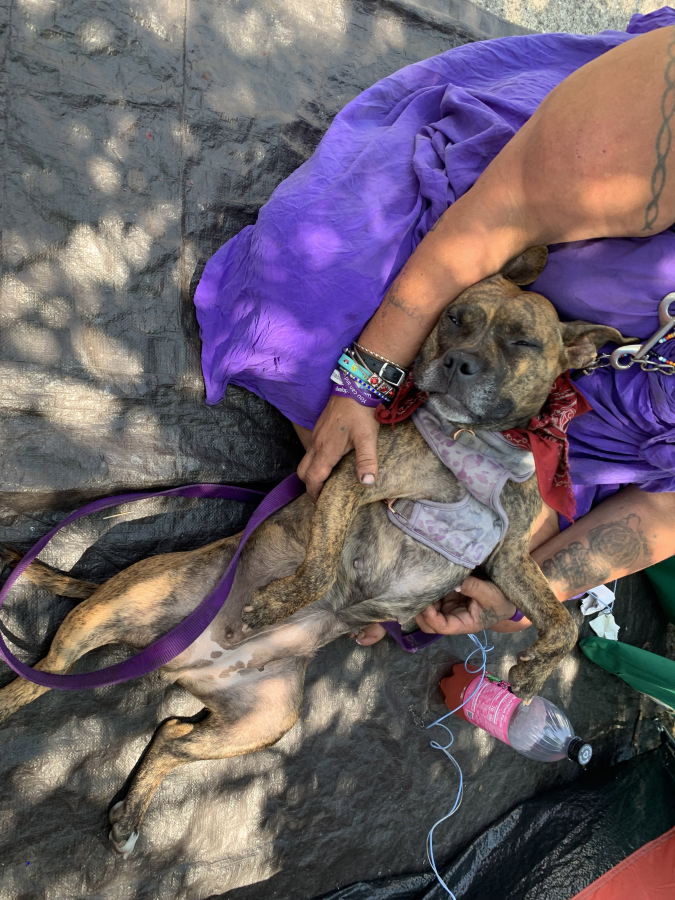With temperatures in the upper 90s earlier this week in Clark County, health officials have advised people to stay indoors with air conditioning and drink plenty of water. But for people living outside who have limited access to both, the hot temperatures can be especially dangerous.
More likely to experience heat-related illnesses, many people experiencing homelessness face barriers to staying cool and hydrated during hot weather.
Outreach teams from the city of Vancouver, Council for the Homeless and Share have recognized the risk and have been giving out supplies this week, such as water and T-shirts.
“If you don’t have food stamps, you’re at the mercy of outreach teams and volunteers for water and other things,” said Jamie Spinelli, the city’s homeless response coordinator.
Unique barriers
Huddled under a patch of shade, Sandra Jernstrom and Reyna passed back and forth a bottle of Brisk — the drink is hot to the touch.
But the pair doesn’t have anything else to drink.
The two live in the encampment located by the Share House in downtown Vancouver. Reyna, who declined to give her last name for privacy, has a tent under a rare spot of shade on the sidewalk, but nearby construction forces many tents to remain in direct sunlight.
“I wake up and it’s too hot to eat,” said Reyna, who thinks she might be pregnant and is experiencing morning sickness. She’s out of food stamps to buy food and water, anyway.
Staying hydrated has been an issue for them both. Jernstrom particularly worries about not only having water for herself, but also her two dogs, FireStone and Bolt.
Although outreach workers passed out flyers that directed people to cooling centers, Jernstrom and Reyna said they had not received any information and didn’t know where to go to stay cool. Reyna said she wouldn’t be able to travel to one, regardless.
“For me, it’s too hot for me to do anything,” Reyna said. “I can’t go to the library — I get a block, and I’m feeling like I’m gonna pass out.”
People living outside may be hesitant to leave their belongings unattended, which creates another barrier to accessing cooling centers, according to Spinelli. She said it can take a lot of effort for unhoused people to assemble all their belongings, which also may deter people from traveling to cooling centers.
“I definitely wouldn’t want to be putting back up a tent in 100-degree weather,” said Spinelli.
A higher risk for heat-related illness
Forecasts call for highs in the low 80s into next week, but Clark County Public Health Director Dr. Alan Melnick said the trend toward higher summer temperatures has been an increasing concern for him.
Common advice to avoid heat-related illnesses includes accessing air conditioning and staying out of the sun. But even finding something as simple as shade can be difficult in dense urban environments, since there isn’t much tree canopy to stay under, Melnick said.
People experiencing homelessness also have a higher chance of having a health condition that puts them more at risk for heat-related illnesses than a housed person, he said.
Someone experiencing milder signs of heat-related illness, like heat exhaustion, might be sweating profusely and be pale, tired, weak and experiencing headaches and vomiting. When this happens, the person needs to go to an air-conditioned environment or take a cool bath or shower, he said.
“But the issue is all these recommendations we’re making about what to do with, for example, heat exhaustion — gaining access to cold beverages in an air-conditioned place — that’s not easy for these folks,” Melnick said. “So once they get heat exhaustion, they’re more at risk of heat stroke.”
Someone experiencing heat stroke, the most severe heat-related illness, might have red skin, nausea, an inability to sweat, a throbbing headache, dizziness or vomiting. Heat stroke can be fatal or result in brain damage, so someone experiencing heat stroke needs to get to a hospital right away, he said.
Even a few hours of air conditioning can help someone living unhoused during hot weather, he said. But when people are living outside, Melnick recommends they rest in shady areas rather than staying inside a tent during hot weather, wear hats and light-colored clothes and be near a place with water.
Share and Council for the Homeless are taking donations for supplies such as water, clothing for hot weather and cooling packs.
“We would love to be able to get more cooling supplies and make sure that we get water out there to people who need it,” said Amy Reynolds, Share’s deputy director.





